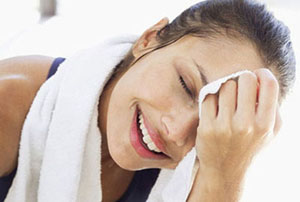Shahnaz Husain
For most of us, a major problem during summer is how to look, feel and smell fresh. But, there are those who suffer from excessive perspiration, known as ‘ hyperhidrosis,” which requires medical treatment.
Certain medical conditions can also lead to excessive sweating, like diabetes, an infection, or thyroid imbalance. So, if you have a problem of excessive sweating, be sure to consult your doctor. Actually perspiration is linked with the body’s process of cooling itself and is one of the important functions of the skin. It also helps the skin to excrete waste matter. The skin contains sweat glands, which are of two kinds – the appocrine and the eccrine. The eccrine glands are found all over the body, more particularly on the palms and soles of the feet. They excrete mainly water and a little salt. The appocrine glands, found in the underarm and pubic regions, excrete sweat which mixes with surface bacteria and decomposes fast, creating problems of odour and stained clothing. In its effort to regulate body temperature, the skin excretes more perspiration as the weather gets warmer.
The waste matter, which is excreted with sweat, has to be removed by daily washing, in order to eliminate the problem of odour and also to feel fresh and clean. It is not really necessary to specify that the best way to deal with it is to take a daily bath. In fact, bath-time is a real pleasure during the summer and many of us take two or three showers daily, just to cool off. A bath is also relaxing and helps to remove fatigue. Bathing and scrubbing help to clear away germs, dirt and odour. All parts of the body should be washed well, specially the neck, armpits and feet, where germs tend to accumulate. Washing the body daily is an adequate form of hygiene, but may not help to overcome the problem of perspiration.
Staying fresh is the main problem, especially for those who have to go out of the house during the day. If you suffer from body odour, carrying a deodorant with you is the only alternative, when you are out for long hours. Try to avoid the sun during mid-day, when the sun’s rays are direct. In fact, you should avoid sun-exposure from noon till 3 p.m., when the heat is at its worst. It is also a good idea to carry a few freshening items in your handbag. Apart from a box of tissues, carry a skin tonic containing a flower extract, like rose or lavender. This can be used to freshen the face and neck by applying it and wiping off with tissues. Wet tissues and special cleansing pads are also available nowadays to freshen up and provide a cool feeling. A small jar of talcum powder and a mild cologne would also help.
Your diet also plays a role in keeping cool. 70% of the human body is made up of water. The loss of water occurs daily and must be replenished on a daily basis too. We do this mainly by drinking water. During the summer months the loss of fluids is greater and that is why we feel thirsty and take in more water and other fluids. In the normal course, we should drink about 6 to 8 glasses of water daily. This would meet the body’s water requirement and also keep the system flushed of toxins and wastes. Of course, the quantity of water intake increases during summer, to make-up the loss of fluids through perspiration.
For excessive perspiration, Ayurveda gives some dietary suggestions. Sip “nimbu paani.” Sip ginger tea before and after your meals. Chop fresh ginger root finely and mix with a pinch of salt. Chew a little of this before your meal. Sipping warm water with your meal may also help. Light diet and less spices are advised. Eat smaller meals.


